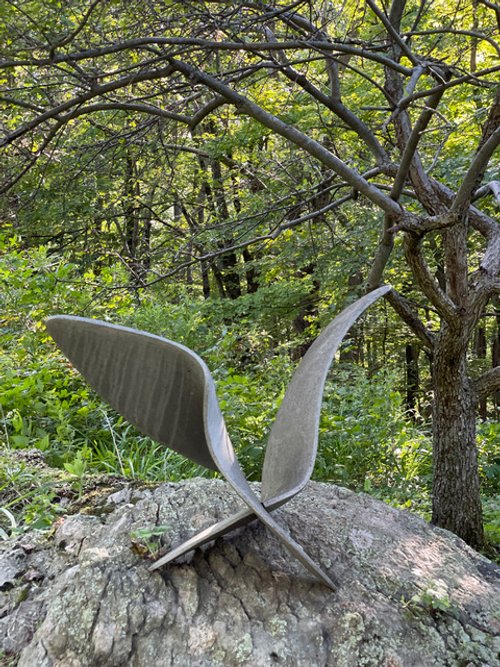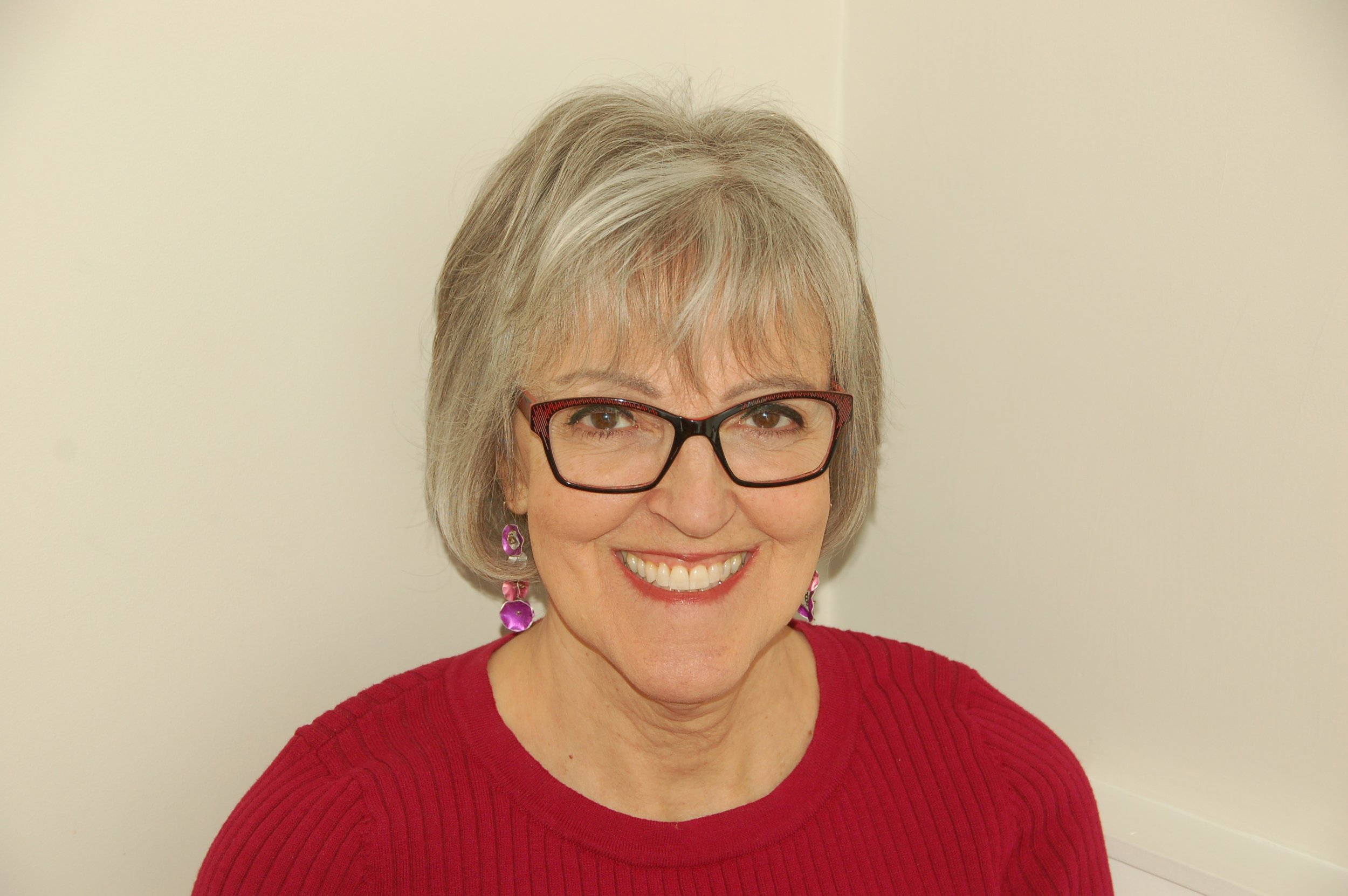BookEnds: Elizabeth Reed & Ann Bookman
In late September, as Breast Cancer Awareness Month approached, Betty Reed interviewed Ann Bookman, poet, social anthropologist, social justice advocate and policy expert in work/family balance and women’s issues. They connected via Zoom and spoke about Ann’s new book of poetry, Blood Lines, and the life events that inspire her writing.
Ann Bookman comes from a long line of accomplished women. Her great-grandmother, a midwife, died in childbirth at age thirty. Her grandmother, who died of ovarian cancer at forty-one, was the first woman in her family to earn a bachelor’s degree. Her aunt, a journalist and author of a book about urban affairs, died of metastatic breast cancer at age forty-seven. Her mother, an accomplished sculptor, died of metastatic breast cancer at age fifty-two. Ann’s poem “White Satin Wedding Slippers” describes the six-year-old poet dressing up in her mother’s evening gowns and her grandmother’s wedding shoes and ends with the poignant line, “I stood before the mirror in my parent’s bedroom, admiring my grownup look, unaware whose shoes I walked in.” Those shoes have led down many paths in Ann’s personal and professional life.
Betty: Your career has been bookended by positions focused on women’s creativity, potential, and power. You’ve worked on family leave policy for over thirty years. Serving in the Clinton administration as Policy and Research Director of the Women’s Bureau at the US Department of Labor, you researched the effects of the Family and Medical Leave Act (FMLA) passed in 1993 which gives eligible employees up to twelve weeks of unpaid, job-protected medical leave. Part of that work was directing a bipartisan commission that studied the impact of FMLA and produced a study A Workable Balance: Report to Congress on Family and Medical Leave Policies. How has the FMLA helped women in the workplace when facing breast cancer or other serious illnesses?
Ann: The results from the ‘Workable Balance’ report proved that the FMLA had no negative effects on employers, as doomsayers predicted, and significant positive effects for employees needing a medical leave, and the provision of “intermittent leave” was particularly helpful to cancer patients going through chemotherapy. However, the fact that the leave was unpaid prevented many people from taking time off for a serious illness. New York, California, and Massachusetts, and a number of other states, now have paid family leave laws and I think—and hope—that as with national healthcare, the states will lead the way in passing a national paid family leave law.
Betty: What compelled you to write this book?
Ann: One reason is to break the silence that existed inside my family and in the culture at large when my mother was diagnosed with breast cancer. I want people to know it’s okay to talk about cancer and the genetic inheritance of cancer specifically. Especially within families, I feel it is important to speak openly about what is happening. My mother was never told that her cancer had metastasized. My father only told me three weeks before she died that she was dying—a moment that I write about in the poem “Black Wing Tips.”
Betty: Your father’s decision to protect you and your mother was complicated. Did you feel robbed of the chance to talk openly with your mother, to provide your mother, and your father, with care and support?
Ann: My father was a wonderful man, and an amazing physician. I can imagine that for him to feel like he couldn’t save her—it destroyed him. They kept giving my mother chemotherapy up until three weeks before she died. As long as they kept trying to control the cancer, my dad didn’t want to say, ‘Your mother is dying.’ I think he was trying to hold onto hope.
Betty: Cancer patients are often described as fighters in a war against cancer. In your poetry, you address living with an uneasy legacy. What have been the fiercest battles for you?
Ann: Anxiety. It’s diffuse—a constant knowing of what could happen—and a very specific, knowing what has already happened in my own family. I was twenty-five when my mother died in 1973. She was originally diagnosed with breast cancer in 1961 and during those years she was one of those fighters, visiting mastectomy patients in the hospital to offer support through the “Reach to Recovery Program.”
Note: Ann’s angst is compounded by the fact that genetic testing revealed that her daughter carries the same BRCA gene mutation. She and her daughter have breast screenings with either a mammogram or a breast MRI every six months. Ann had a post-menopausal oophorectomy. The testing and screening that she and her daughter have utilized are, in her opinion, critical for their health and wellbeing. Ann wishes her maternal grandmother, aunt, and mother had had access to these life-saving tools. However, the process of getting tested regularly has its own challenges.
Betty: What happens to you in that process?
Ann: The anxiety starts weeks before the appointment and continues while waiting for the results. The silver lining is that we’re buddies. We send messages, emojis; we support each other through the waiting.
Betty: Knowing that your daughter carries the BRCA gene mutation must have produced powerful emotions. In “But Not This” you write “I want my daughter to inherit my green thumb, the serpentine marble sculpture my mother carved, my Child’s First Book of Verse—a with page corner turned down for “The Lamplighter”—but not this.” How were your emotions of your daughter’s diagnosis different from your diagnosis?
Ann: It was worse. I lived for a long time knowing the history of my maternal forbearers, but not of my genetic inheritance. After my genetic testing, my anxiety increased of course. But knowing about my daughter—she shakes her head slowly—was devastating.
Betty: What prompted you to get genetic testing?
Ann: A genetic counselor charted my genetic family tree and encouraged me to consider getting tested. The decision was all mine. Like any reproductive decision, a woman’s choice of getting tested and whether to take prophylactic action is very personal and must be discussed with a trusted doctor or other medical professional. What is important and a key starting point is that women have the information and access to genetic counseling.
Betty: You write so effectively about genes and their power in the poem “Knotted Cord.” How have you managed that power? What has been your saving grace?
Ann: I think the love of my husband and my children—and now my two beautiful grandsons —has been my refuge. I also love to garden —both flowers and vegetables!—and watch the beauty of each season from a special place my family has in the Hudson Valley. My poem “Hiking in the Mountains of Moab” is a metaphor for my spiritual journey and its relationship with the natural world. I have a deep love of Judaism and its traditions, and I see my spirituality as both including and transcending Judaism. And of course, writing! Writing poetry is a gift and guide.
Betty: In the poem “Migration Routes” you write that “bloodstreams channel a mystery, personal yet shared” [transporting] “a heavy leather trunk” of “prophetic genes, spliced memories, uninhabited dreams.” The image of heavy baggage is a perfect description for inheritance!
Ann: (Laughs!)
Betty: I love the punchline—"No one applied for entrance to my body. Some women feel violated or betrayed by their bodies when cancer is diagnosed. Did you ever feel this way?
Ann: No, and I should add that I have not had cancer—and hope I never will. Inheriting this gene mutation is complicated. There are many levels of understanding and emotions. I inherited so much more than just the BRCA gene from my great-grandmother, grandmother, mother, and aunt—and generations of Ashkenazi women before them—that I value and hold dear. My mother loved being a wife, having children, and she was also an artist, a sculptor. This legacy of creativity and generativity is very precious to me.
Betty: Inspired by the women in your family, how do you transcend your genetic composition?
Ann: My mother drew and sculpted many birds. A photograph of her piece ‘Flight Forms’ is included as the last image at the end of the book. Writing poetry often makes me feel as if I’m soaring. I don’t want to be stuck on the ground.
-----------------------------------------------------------------------------------------------------------------
Wildfire Community is a community for young women diagnosed with breast cancer. They also publish a magazine in which Elizabeth Reed’s Breast Cancer Babby appeared.
Here are two organizations that Ann Bookman praises for their impactful work in providing public education about genetic testing and access to high-quality cancer care are: Sharesheret and FORCE.
Ann Bookman’s Blood Lines can be purchased here.
Artist’s Statement
As a three-time cancer survivor and parent of a child with Juvenile Arthritis, Betty believes in adjusting, not giving up on, goals. Writing and music are her safe havens and humor is her saving grace.
Elizabeth (Betty) Reed is a writer, musician, activist and traveler. She is writing a memoir about surviving leech attacks in Sumatra and other adventures in marriage and parenting. Her work has been published in The Boston Globe Magazine, The Rumpus, Parents, and other journals. For more information, please visit her website: bettyreedwrites.com


